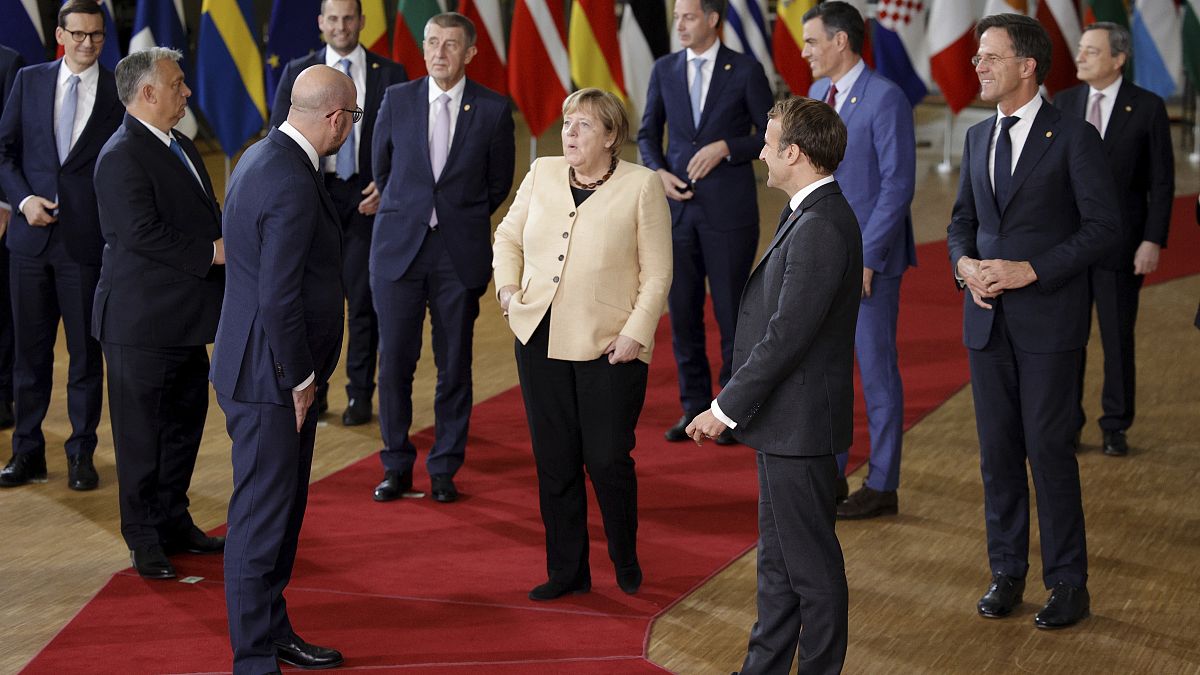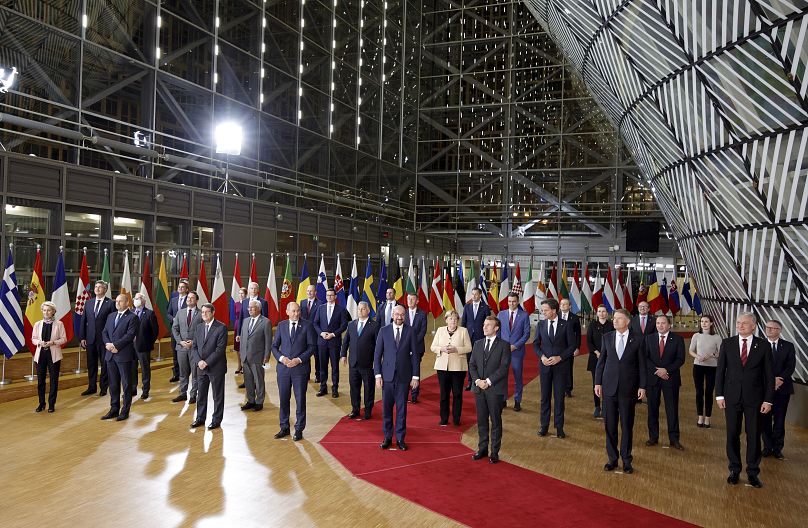The European Council rejected a push from Eastern countries to build fences under EU funding to prevent the arrival of new migrants.
After a two-day summit in Brussels, EU leaders shunned sweeping action and opted instead for moderation to tackle two of the bloc's most pressing crises: the ongoing energy crunch and the Polish challenge to EU law primacy.
The two issues were rare items for the European Council, which is considered the supreme political authority of the European Union and usually deals with strategic, long-term matters. But the urgency of both crises thrust them to the very top of the agenda – without yielding major breakthroughs.
On the energy crunch, which has sent electricity bills soaring in recent weeks, EU leaders endorsed the middle-ground approach unveiled last week by the European Commission, which includes measures such as direct income support for vulnerable households, state aid for struggling companies and reductions in taxes and special levies.
All these measures, the Commission noted, must be targeted, tailored and temporary, an opinion shared by Germany and other Northern member states, who are reluctant of forceful intervention. Commission President Ursula von der Leyen noted that 20 member states have already announced their intention to introduce these kinds of short-term solutions.
The executive considers the situation is the result of free market dynamics: countries recovering from the pandemic around the world are thirsty for energy to kick start their economic activity but the stronger demand hasn't been met by stronger supplies, leading to a pronounced hike in natural gas prices. The surge is expected to last until April.
Although not included in the summit's conclusions, structural reforms for the long haul could be discussed in the coming months. President von der Leyen said leaders were open to exploring the creation of a strategic gas reserve for the bloc, the voluntary joint procurement of energy supplies and the decoupling of the electricity and natural gas prices, a cause championed by France.
The energy crunch was the first item of the meeting on Thursday and took up over four hours. Among the most critical voices was Czech Prime Minister Andrej Babiš, who complained about the impact of the Emissions Trading System (ETS) on energy bills, an assessment disputed by the Commission.
The ETS is a mandatory scheme that puts a price on carbon emissions released by Europe's most polluting industries, including the electricity sector. Companies have to buy and trade carbon permits in order to meet their industrial needs. Permit prices have also increased this year, from €33 in early January to almost €60 in October.
The Commission estimates this rise has contributed to over a fifth of the total energy crunch, but several Eastern member states have capitalised on soaring bills to attack the EST and, by extension, the EU's climate policies. Some countries have raised concerns over alleged market manipulation inside the ETS, claims that Brussels said were unfounded.
Still, Babiš, who recently lost reelection, managed to hijack the summit's conclusions: the text now asks the Commission to "study the functioning of the gas and electricity markets, as well as the ETS market" with the help of ESMA, the bloc's independent authority of the financial system.
Von der Leyen pointed out EU countries have at their disposal over €10 billion in ETS revenues to cushion the impact of the soaring prices.
The energy crunch will be further discussed during an extraordinary meeting of national ministers next week and will be revisited by EU leaders in the next summit, scheduled for mid-December.
Polexit before dinner
The talks on energy crunch were followed by a brief discussion around the coronavirus pandemic. Leaders pledged to fight vaccine disinformation, facilitate cross-border movement and boost international donations for developing countries. As of today, only 3% of people in low-income countries have received at least one dose.
Then, European Council President Charles Michel gave the floor to Polish Prime Minister Mateusz Morawiecki, who shared with his colleagues his point of view regarding the defiant ruling issued earlier this month by the Polish Constitutional Court.
In its majority ruling, the tribunal directly challenged the longstanding principle of EU law primacy and openly rejected two key articles of the EU treaties: Article 1, which establishes the conferral of competences from member states to the institutions, and Article 19, which sets up the EU's Court of Justice (ECJ). The judges said these provisions were incompatible with the Polish constitution.
The verdict is considered unprecedented in nature and is raising fears of an imminent "Polexit" that would put Poland right outside the EU's legal order. It also brought harsh condemnation from other member states, with Irish Prime Minister Micheál Martin calling it a "slap in the face".
The debate on Thursday evening had a less combative tone, with EU officials describing a "serene atmosphere". Leaders reaffirmed the "fundamental" importance of the rule of law and independent judiciary and agreed to use political dialogue with "mutual respect" to find a solution.
"There was a clear message from an overwhelming group of leaders at the table that we are highly worried about the situation in Poland. Of course, there's always an element of dialogue," said Dutch Prime Minister Mark Rutte after exiting the meeting on Thursday night.
"But at the same time, there's also an understanding that we fully support the Commission, most of us, in clearly putting forward the necessary measures to react to what the Polish government is doing."
European Commission President Ursula von der Leyen has promised to use all of her executive powers to reassert the primacy of EU law inside Poland. Potential actions include opening a new infringement procedure, an avenue already tried and tested with mixed results, or triggering a new conditionality mechanism to freeze EU funds, of which Poland is the largest recipient.
But on Friday, after days of mounting speculation, von der Leyen confirmed the Commission will not make use of the budgetary scheme, in place since January, until a pending ECJ case is resolved. The case was filed by Poland and Hungary, who asked the Luxembourg court to settle the mechanism's legal validity. The President added that, while the executive awaits the ruling, it can start sending letters with questions to the member states suspected of breaching EU law.
Von der Leyen stressed that Warsaw must comply with a previous ECJ verdict that ordered the immediate dismantling of the controversial disciplinary chamber of judges and the reinstitution of all the judges who had been unlawfully removed.
"We have a long road ahead of us," she said in a press conference after the summit.
"This road is a combination of dialogue, legal response and concrete action to restore the independence of the judiciary."
Also on Friday, PM Morawiecki met with Marine Le Pen, the president of the far-right National Rally party and one of Europe's leading eurosceptic voices. Le Pen condemned the "unacceptable blackmail exercised by the European Commission" and expressed her support for the Polish government.
'No EU funding for barbed wires'
The most tense moment of the summit arrived when leaders discussed the typically divisive issue of migration management.
This time, the talks centred on the ongoing dispute with Belarus, which the EU accuses of encouraging illegal crossings into Poland, Lithuania and Latvia. Brussels believes President Alexander Lukashenko is trying to sow chaos as revenge for the sanctions imposed by the bloc.
Lukashenko denies all accusations and says Europe is to blame for the humanitarian crisis. In the meantime, hundreds of migrants, mainly from Iraq and Afghanistan, continue to be stranded on the border. Eight have died so far.
"No one's life should be used for political [purposes]", said von der Leyen, who described Belarusian behaviour as a "hybrid attack".
As the situation deteriorates, some countries have become more vocal in their demands for hands-on remedies. Earlier this month, 12 member states – Austria, Bulgaria, Cyprus, Czech Republic, Denmark, Greece, Hungary, Estonia, Latvia, Lithuania, Poland and Slovakia – sent a letter to the Commission asking EU funding for "physical barriers" and for a "more abuse-resistant" migration policy, a reference that was interpreted as a call to legalise "pushbacks", which are prohibitive under international law.
During the meeting, Poland and the Baltic countries took the lead and renewed their demands, with support from Greece and Cyprus, two countries who have seen migrants arrive in their territories encouraged by Turkish authorities. The five asked to build fences and buy surveillance drones under the EU budget, Euronews understands.
But although their petitions prompted an intensive and extended discussion, they didn't materialise into concrete results due to strong opposition from the other member states and the Commission.
"I was very clear," von der Leyen said, "there will no [EU] funding of barbed wire and walls."
The summit's conclusions reflect a compromise to allocate more EU funding for third countries hosting refugees, like Turkey, Lebanon, Jordan and Egypt, and deploy existing tools, like Frontex.
The EU fears Lukashenko will soon open new routes to send more migrants to the border. In a bid to prevent new arrivals, the bloc will increase its engagement with countries whose citizens are being lured into flying to Minsk. Brussels will also consider a new raft on sanctions against Belarusian individuals and companies.
Farewell to Merkel
The summit wasn't all about hot-button topics. On Thursday evening, leaders took a break and gathered outside the meeting room to take a family picture and bid farewell to the European Council's most veteran and influential member: German Chancellor Angela Merkel.
In her 16 years leading Germany, Merkel had guided the EU through some of its greatest challenges, like the Great Recession, the migration crisis, Brexit and the pandemic. Many have described Merkel as Europe's de-factor leader and her green-light is considered a must for any big project.
This month's Council was Merkel's 107th and most likely her last before being succeeded by socialist Olaf Scholz, who's negotiating a three-party coalition with the Greens and the liberal FDP.
President Michel paid tribute to her wisdom during complex times and "extreme sobriety" and simplicity of character, as well as to her scientific mind and intellectual curiosity.
The European Council without Merkel is like "Rome without the Vatican or Paris without the Eiffel tower", said Michel. "You are a compass and a shining light of our European project."
Former US President Barack Obama sent a video message to honour Merkel's leadership and her "fidelity to universal values".
"Very few political leaders can be counted upon to put their principles above any narrow definition of self-interest," Obama said, calling the Chancellor his friend and role model.
"Your beloved German people, and the entire world, owe you a great debt of gratitude for taking the high ground for so many years. Thanks to you, the centre has held through many storms."
Merkel and Swedish PM Stefan Löfven, who's also departing, were handed a personalised gift from their colleagues: a crystallised replica of the Europa building, the seat of the European Council.
The Chancellor received a standing ovation, although she was later placed in the second row for the family picture, whereas Emmanuel Macron was put next to Michel in the first line.

